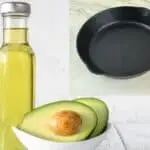Table of Contents
- Why does my cast iron skillet has black residue?
- What is the black residue on a cast iron skillet?
- Why does my cast iron skillet has black residue?
- How to remove black residues?
- More Tips of Cleaning black residues from cast iron skillets
- How to avoid getting black residues?
- In Closing
Why does my cast iron skillet has black residue?
Cast iron skillets can last a long time if properly cared for and maintained. Regular seasoning transforms cast iron cookware into non-stick and is simple to use.
Sometimes while cooking some black specks and residues appear on the skillet. The first question that comes to mind of the cook is that why does my cast iron skillet has black residue? Should I be worried? is this black residue on cast iron is bad?
Carbon deposits are the most common cause of black residue on your cast iron pan. It is not hazardous. Due to the overheating of oil or fats, or particles of burnt food, carbon deposits cause that black residue to come off your cast iron pan and accumulate in your food or cleaning cloth form.
Here in this article, we’ll explain how to clean a cast-iron pan, as well as what you should know about black residue and ways to avoid it.
What is the black residue on a cast iron skillet?
It is a very thin, black film that covers the surface of the cast iron skillets. You can easily see this residue around the lip and side edges. The carbon deposits on your skillet might also contain other particles such as burnt food or rust from your utensils because cast iron cookware gets rusty too.
The black specks and dirt residue on the pan will not affect it adversely unless it’s left there for too long without cleaning and care.
Why does my cast iron skillet has black residue?
There are 10 main causes of experiencing black residues while using a cast-iron skillet.
- High Heat: The majority of the time, this residue is caused by using your pan on a high heat setting. Pans will generally smoke and turn black if heated over 450 degrees Fahrenheit (232 degrees Celsius).
- Seasoning: If you’ve just purchased an unseasoned cast iron skillet, it might also bring about small dark particles to stick to the surface after cooking and removal from the heat source. The best way to deal with this problem is to wash the pan immediately with warm water and steel wool or cleanser then coat it in oil while still wet before letting it dry completely. This process should only need to be done once; afterwards, your skillet should be well seasoned.
- Food: Burnt food or other types of stains can stick to your pan and result in a black film. This is particularly true if you’ve left the pan on the stove for too long without stirring or mixing.
- Rust: Using water that’s too hot or leaving food on the skillet will cause rust, which generally appears as red spots that aren’t easily removed from your pan. When rust interferes with cooking, it’s time to scrub your skillet clean.
- Food Storage: Leaving acidic foods such as tomatoes or lemon juice sitting in a cast iron skillet over a period of time can cause discoloration and staining around the lip and sides of the pan. To avoid this issue, use glass storage containers instead of storing food in a cast iron dish.
- Debris: Small, charred pieces of food or small insects that have burned to the bottom of your skillet can also cause dark marks on your pan if they’re not removed promptly. Take care to clean out debris from your cast iron cookware after each use.
- Overheating Oil in the Pan: The oil or fat in your food can easily get overheated and turn black because of frying in high temperatures. It’s important for cooking with oils not to let them smoke and burn in your skillet as this will leave behind carbon deposits which has toxins and may cause harm even if they are burnt.
- Burnt Sponge: If you’ve let some sponges sit in a cast iron pan for too long, the sponge can leave dark stains on your cookware that’s not easy to remove. In addition, sponges will rust if exposed to water that’s too hot and this is one way you might notice black marks on your pans.
- Dishwasher: Many people make the mistake of placing their cast iron skillet in the dishwasher, but this only leads to dulling the seasoning or removing it completely because soap residue remains after washing. If your pan isn’t completely dried out from use, it can also encourage rusting which makes those black specks much more prominent.
- Polishing: Some polishes may contain harsh chemicals that can damage or strip away seasoning from your cast iron pan. If this is the case, you might need to re-season your pan to fix the problem.
In all of these situations, you will be better off if you clean your cast iron skillet right after use and dry it thoroughly before storing away. When your pans are conditioned correctly, they should provide a nonstick surface that’s easy to manage and maintain for years of cooking pleasure.
How to remove black residues?
Here are 5 simple steps that you can use to remove stubborn black residue that is stuck on your cast iron pan.
Firstly you will need:
– Salt (amount depends on how large your skillet is)
– Potato (optional, for gentle scrubbing)
– Oil or fat (Can also use lard or bacon grease)
Instructions:
- Pour some salt onto the pan and spread it around evenly to make sure there are no gaps in coverage.
- Scrub with a paper towel until the residue lifts off easily.
- If needed, lightly rub the area with half of a peeled potato; this helps lift any stubborn pieces that were left behind.
- Rinse your entire pan under warm water until all soap residue is gone and there’s not much salt coming off when you wipe it away (If using water instead of oil).
- Dry thoroughly and then add a thin layer of fat or oil to the pan before storing it.
More Tips of Cleaning black residues from cast iron skillets
Lightly scrubbing with baking soda and warm water:
You can moisten the surface of your pan with water then sprinkle some baking soda before applying a bit of elbow grease. The combination should break down these spots without much effort if you let it sit for 10 minutes or so.
Cleaning solution made from vinegar or lemon juice:
A homemade mixture of 3/4 cup white vinegar or the juice from half a lemon mixed in 1 quart of hot water makes an effective cleaning agent which works to dissolve sticky bits very quickly, especially if applied immediately after cooking.
Oven cleaner:
If you feel like using more extreme measures, try spraying oven cleaner on your pan and using a sponge or non-abrasive pad to remove buildup. This can strip away seasoning, so use it cautiously.
Denture cleaner tablets
Place two denture cleaning tablets in 1/2 cup of white vinegar, let them dissolve completely then rub the paste over the black spots before wiping clean with a sponge that has been moistened with plain water.
Baking soda paste
Make a thick mixture of baking soda and water until it’s smooth enough to spread over residues, leave for 10 minutes then wipe clean without rinsing afterward.
How to avoid getting black residues?
There are certain things that you can do to avoid getting black marks on your skillets.
Do not use soap
Soap leaves soap scum which encourages rusting and spotting so it’s best to avoid using it altogether.
Always clean after cooking:
When you first finish cooking, rinse the pan with warm water and wipe dry before setting it aside. This way, there is no cooling liquid left in your skillet when you store it away overnight or during any other period of time where you would like to set it down.
Be gentle with seasoning:
Cast iron pans are tricky enough as it is without ruining the seasoning by doing things like exposing them to extreme heat (don’t place them directly over an open flame) or imposing harsh scrubbing.
In Closing
Cooking with cast iron has certain advantages. As a result of this, the question “Is black residue on a cast iron skillet dangerous?” is meaningless. Having black residue on your cast iron pan may detract from the appearance of your dish, but the good news is that it isn’t harmful to you or avoidable. You can eliminate unwanted fats and oils by not overcooking them and taking appropriate care of your pan.
Although iron pans are quite sturdy, knowing how to get the most out of your cookware will provide you with the most gratification in their performance for longer.




